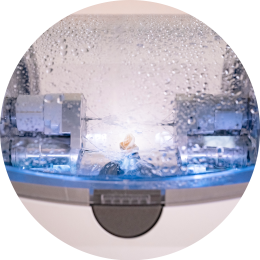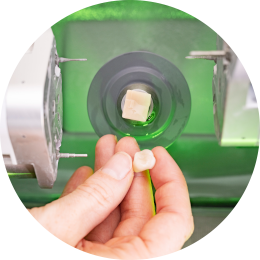Tooth preservation: Tooth decay treatment, crowns, root canal treatments
Tooth decay treatment with minor defects
Our services




Minor decay-related defects are treated with high-quality composite which can be applied directly into the tooth once the decay has been removed. We perform the tooth decay treatment precisely and with great care so as to optimize the lifespan of the fillings. If the tooth decay is treated early enough, follow-up treatments such as root canal treatment can be avoided. Regular check-ups are extremely helpful in detecting tooth decay in good time.
Partial crowns and crowns made from high-performance ceramic
If the tooth decay is already very extensive in the affected tooth, it may be necessary to fit a ceramic partial or full crown. In this case, the tooth decay is removed and an impression is taken of the jaw and sent to the laboratory. The dental technician then produces the corresponding ceramic work, which we will fit during your next appointment. You will of course be provided with a temporary restoration whilst you wait for the ceramic work to be performed. Ceramic is a very high-quality, aesthetically pleasing and long-lasting dentistry material that is also known for its high levels of compatibility.
Endodontology | Root canal treatments
If the tooth decay is extensive and has already reached the nerve tissue, this leads to inflammation of the tissue, which is often very painful. In this case, root canal treatment will be necessary, which may prevent the need to remove the diseased tooth. Instead, only the nerve tissue is removed, and a root filling is then performed.
Depending on the substance loss caused by the preceding tooth decay, it is recommended that either a partial or full crown be fitted on the root canal-treated tooth. The tooth can then often last for decades. Our root canal treatments also use state-of-the art technology such as the WaveOneGold reciprocating machine-based processing system.
Root tip resection – the surgical tooth rescue
If a root canal-treated tooth is still showing signs of inflammation at the root tip, it may be necessary to carry out a root tip resection. In this case, only the inflamed root tip is removed, and the inflamed tissue is then extracted so as to prevent the need to extract (remove) the tooth.
We work with you to decide on the correct material and tooth preservation treatment for you based on the affected tooth.

